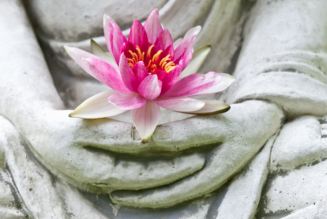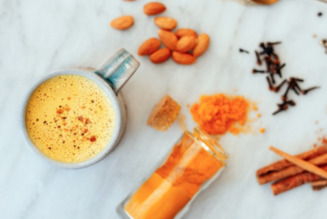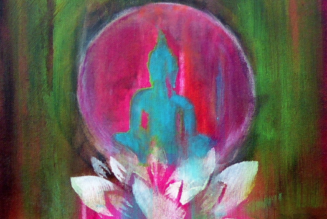by
There was no siren nor light nor gentle nudge that woke me up. Nothing external interrupted me and yet, suddenly, in the middle of the night, I was awake and my brain was racing. I wanted sleep; I needed sleep; and none was coming. All I could do was lie there, frantically making mental lists and composing what seemed to be brilliant and urgent plans that I would no doubt forget in the morning. I didn’t even need to look at the clock. I knew what it would say. It had said the same thing every night for a week: 2:30 a.m.
“because your mind is going too fast…”
“If you wake up between 2:00 and 3:00 and can’t go back to sleep because your mind is going too fast, that’s the hallmark of a Vata imbalance,” said Dr. Jim Davis, who runs the Integrative Wellness Center at Maharishi University of Management in Fairfield, Iowa. As soon as he said it, I knew he was right. After a long slog through the American medical landscape, I had found an ayurvedic doctor who determined that I’m equal parts Vata and Kapha, but when I’m out of balance, it’s my Vata that goes haywire. And this time of year, the dry months of late fall, can send anyone’s Vata spiraling. And when that happens, say hello to 2:00 a.m.
“If you draw a clock face,” Dr. Davis said, “from 6:00 – 10:00 a.m. or p.m. is Kapha time, 10:00 – 2:00 is Pitta and 2:00 – 6:00 is Vata. And you can prove it to yourself just thinking about the day.” For example: if you wake up at 6:00 a.m., chances are you’re still a little sleepy, maybe moving slowly in the way that Kapha’s earth and water and muddy mixtures move. And by 10:00 a.m., you might feel a little fire in the belly. You’re getting stuff done and you might start thinking about food. By noon, you’re ready for lunch.
“Pitta is all about digestion,” Dr. Davis said. “High Pitta is right at 12:00.” And that is why noon is the best time for the main meal of the day, when our digestive fire (Pitta) is strongest. Vata is all about movement, communication and the nervous system. It starts its reign at 2:00 in the afternoon and gives way to Kapha at 6:00 p.m. According to ayurvedic principles, the best time to go to bed is right around, or just before, 10:00 p.m., when Kapha gives way to Pitta. During the next four hours, Pitta will digest the day and make sense of the emotional and mental events.
“All cell repair mechanisms work around that time, too,” Dr. Davis said.
At 2:00, Pitta gives way to Vata which, theoretically, would deliver the goods Pitta digested all the way to the cells (Vata is all about circulation). If that’s not happening, and you find yourself awake and your mind racing, Dr. Davis has several suggestions:
- Try to go to bed closer to 10:00 p.m.
- Avoid stimulation and blinking screens — television, computer and phone — just before bedtime.
- Develop a steady meditation practice, ideally at sundown or sunrise, the start of Kapha time.
- Try to exercise during the day.
- Try not to eat a big meal late in the day.
- Take one or two Deep Rest tablets about an hour before bedtime to help with sleeping throughout the night. Or try one or two Blissful Sleep tablets at bedtime for help falling asleep faster.
Click Here – Promo Code: healthyayurveda for 10% discount on your first order!!
Alan Marks, CEO of vpk® by Maharishi Ayurveda, has a few more suggestions:
- Try to eat your main meal between 12:00 p.m. and 2:00 p.m.
- Eat a well-cooked, easy-to-digest dinner at least three hours before bedtime.
- Consider an abhyanga (ayurvedic self-massage) before bed.
- Let the sun set in your home (lights out and electronics off) if falling asleep is an issue. This can help reset your biological clock.
- Take a walk in the early morning light. This is also a good way to reset your biological clock.
Vata loves heavy. If you tend toward Vata imbalance, feeling cold easily, try letting the temp in your home drop at night and weigh yourself down with heavy blankets. Wear socks to bed. Vata loves warm feet.
Pitta loves cool. If you tend toward Pitta imbalance, feeling hot easily, try dropping the temp at night and using fewer covers — if this feels comfortable. Any Pitta-predominant person will tell you that there is nothing worse than waking up hot in the night.
If you wake in the night with a cough, or feeling a discomfort in your throat, but you are not sick, consider that you may be having occasional acid reflux. Following an ayurvedic meal routine will reduce this. Also try taking an Aci-Balance one hour before bed.
Marks goes on to explain that, “When we eat a heavy dinner, we are telling our body to do two opposing things: settle and sleep, and stay active and digest.” The result is that we wake up not completely rested and with inefficient digestion. Have you ever experienced waking up in the morning to your stomach feeling like it is hungry even though you had a big dinner?… You’re probably not actually hungry; rather, your system is starting to pick up digesting dinner again. Thus, the downward cycle of wakeful sleep and incomplete digestion.
When we wake in the night, especially around Vata time, sometimes the character of our thoughts is just a reflection of our body trying to raise the metabolism enough to digest dinner. The mind is a thinking machine and it can’t have a mood, or physical activity in the body, on an abstract basis, so the mind will pick up what is closest to it and “justify” the activity of the body by diving into a train of thoughts. It’s the opposite of “food coma.” It’s food “Vata derangement!” So a lighter, easy-to-digest dinner is one way to set the foundation for a sound night of sleep.
Taking Organic Digest Tone (Triphala Plus) is a great way to remove the toxins that build up from inefficient digestion (ama) and also to help with regular elimination. Addressing these two aspects of digestion is a great step in keeping Vata in balance and helping with good sleep.

Jody Berger writes about food, sports and wellness for a variety of publications. She is the author of Misdiagnosed: One Woman’s Tour of — and Escape From — Healthcareland. Connect with Jody through Twitter, Facebook or her website.
Disclaimer
The sole purpose of these articles is to provide information about the tradition of ayurveda. This information is not intended for use in the diagnosis, treatment, cure or prevention of any disease. If you have any serious acute or chronic health concern, please consult a trained health professional who can fully assess your needs and address them effectively. If you are seeking the medical advice of a trained ayurvedic expert, call or e-mail us for the number of a physician in your area. Check with your doctor before taking herbs or using essential oils when pregnant or nursing.




![Female Health: Amenorrhea [cessation of menses] – An Ayurvedic Perspective](https://healthyayurveda.com/wp-content/uploads/2015/07/1.-Amenorhea--327x219.png)




